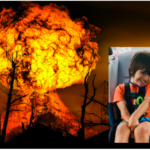
When we decide to become parents, we never imagine our child is going to be anything less than “perfect,” with 10 toes, 10 fingers, and the best parts of ourselves and our partner. The harsh reality is that this is not always true. Some people find this out early when their child is still in the womb. Others find out seconds or minutes after their child is born. Then there are those who find out years later. I am in the “years later” category. And even when issues are identified, even though there are always signs, you never actually think your child isn’t going to catch up … until you are told differently by specialists giving indisputable medical facts who suggest potential medical treatments.
Now, let’s talk about medical treatments. As we are all so different, not everyone will react the same way to every treatment, medication, or therapy so not every form of treatment will render the same results. No diagnosis means the exact same thing for an individual impacted. A very smart and wonderful professor once said, “It’s called ‘practicing medicine,’ not ‘doing medicine.’” That has been one of the best pieces of advice I have had going into motherhood—and in getting a life-altering diagnosis.
So, perspective is something I have been trying to teach my 6-year-old daughter. I took two water bottles, one larger and one smaller. I moved the smaller one five feet closer to her so she could see both and asked, “Which one is larger?” Now, you and I both know that nothing changed; the larger one was still larger. Still, she got it wrong every time until I explained that it’s not about what your eyes are telling your brain, it’s about what your brain already knows. But what if your brain doesn’t already know? What if that little piece of new information, small to someone else, seems really big to you?
When I was in a painting class in college, we were told to take a few steps back, then further and further. With each step back, we could see more of the space and we were able to make a better observation of our visual field and decide what really had to be done. That happens a lot with life. When you are in the beginning part of a diagnosis, all you can do is focus on what is right in front of you. If you are handed a list of things to do, maybe you muster up the strength and you do them. You can’t even process your emotions because you are so busy doing, researching, trying to focus on one thing at a time. The reality is that there are 20+ things, and you now have to prioritize in a new way than before, but you don’t even know what that means.
What I have realized is that my years of viewing situations of my own and others from so many different perspectives helped me when we got our diagnosis for our son. Instead of looking at others and feeling like I didn’t deserve to feel the pain, sadness, and frustration, I was able to better let myself do those things. I’m not saying I always did those things right or that I continue to do them correctly, but I do them. I let myself feel.
Perspective also lets me have more compassion for people whose child is thriving compared to mine because I understand it doesn’t mean they felt less pain from their child’s diagnosis. This is also true for those people who haven’t yet received a diagnosis for their child as well as for those people with no diagnosis for their child who are just dealing with a “typical child” with “typical” struggles. It also doesn’t mean I should feel guilty when someone else’s child struggles more than mine. Perspective in parenting means respect for other peoples’ struggles regardless what those struggles are.
Parenting is hard. Throw in a complication such as being medically fragile or having a cognitive impairment, dyslexia, or apraxia, etc.—lifelong hurdles for our loved ones—and it becomes that much harder. Still, it’s not a competition; no one’s fight is less or more important than mine. We can’t know the struggles of someone else and their impact on that person or family. We should offer support to all parents as much as possible because everyone is dealing with something. We are all just parents trying to get through the day.
Perspective.




Congrats on the new website and your first post! Still learning about perspective. ♥️
Thank you so much, I think we all are 🙂